Featured Posts

- Index of Psychological Studies of Presidents and Other Leaders Conducted at the Unit for the Study of Personality in Politics
- The Personality Profile of U.S. Supreme Court Associate Justice Brett Kavanaugh
- The Leadership Style of North Korean Leader Kim Jong-un
- North Korea Threat Assessment: The Psychological Profile of Kim Jong-un
- Russia Threat Assessment: Psychological Profile of Vladimir Putin
- The Personality Profile of 2016 Republican Presidential Candidate Donald Trump
- Donald Trump's Narcissism Is Not the Main Issue
- New Website on the Psychology of Politics
- Unit for the Study of Personality in Politics --- 'Media Tipsheet'
categories

- Afghanistan (228)
- Al Gore (2)
- Amy Klobuchar (4)
- Ayman al-Zawahiri (7)
- Barack Obama (60)
- Ben Carson (2)
- Bernie Sanders (7)
- Beto O'Rourke (3)
- Bill Clinton (4)
- Bob Dole (2)
- Campaign log (109)
- Chris Christie (2)
- Chuck Hagel (7)
- Criminal profiles (8)
- Dick Cheney (11)
- Domestic resistance movements (21)
- Donald Trump (31)
- Economy (33)
- Elizabeth Warren (4)
- Environment (24)
- George H. W. Bush (1)
- George W. Bush (21)
- Hillary Clinton (9)
- Immigration (39)
- Iran (43)
- Iraq (258)
- Jeb Bush (3)
- Joe Biden (13)
- John Edwards (2)
- John Kasich (2)
- John Kerry (1)
- John McCain (7)
- Kamala Harris (5)
- Kim Jong-il (3)
- Kim Jong-un (11)
- Law enforcement (25)
- Libya (18)
- Mahmoud Ahmadinejad (6)
- Marco Rubio (2)
- Michael Bloomberg (1)
- Michele Bachmann (173)
- Mike Pence (3)
- Military casualties (234)
- Missing person cases (37)
- Mitt Romney (13)
- Muqtada al-Sadr (10)
- Muslim Brotherhood (6)
- National security (16)
- Nelson Mandela (4)
- News (5)
- North Korea (36)
- Osama bin Laden (19)
- Pakistan (49)
- Personal log (25)
- Pete Buttigieg (4)
- Presidential candidates (19)
- Religious persecution (11)
- Rick Perry (3)
- Rick Santorum (2)
- Robert Mugabe (2)
- Rudy Giuliani (4)
- Russia (7)
- Sarah Palin (7)
- Scott Walker (2)
- Somalia (20)
- Supreme Court (4)
- Syria (5)
- Ted Cruz (4)
- Terrorism (65)
- Tim Pawlenty (8)
- Tom Horner (14)
- Tributes (40)
- Uncategorized (50)
- Vladimir Putin (4)
- Xi Jinping (2)
- Yemen (24)
Links

archives

- November 2021
- January 2021
- November 2020
- October 2020
- September 2020
- August 2020
- July 2020
- April 2020
- March 2020
- February 2020
- January 2020
- December 2019
- October 2019
- July 2019
- May 2019
- April 2019
- March 2019
- February 2019
- January 2019
- December 2018
- September 2018
- August 2018
- July 2018
- June 2018
- April 2018
- March 2018
- February 2018
- January 2018
- August 2017
- July 2017
- June 2017
- May 2017
- April 2017
- February 2017
- January 2017
- December 2016
- November 2016
- October 2016
- September 2016
- August 2016
- July 2016
- June 2016
- May 2016
- April 2016
- March 2016
- February 2016
- January 2016
- December 2015
- November 2015
- October 2015
- September 2015
- August 2015
- July 2015
- June 2015
- May 2015
- April 2015
- March 2015
- February 2015
- January 2015
- December 2014
- November 2014
- October 2014
- September 2014
- August 2014
- July 2014
- June 2014
- May 2014
- April 2014
- March 2014
- February 2014
- January 2014
- December 2013
- November 2013
- October 2013
- September 2013
- August 2013
- July 2013
- June 2013
- May 2013
- April 2013
- March 2013
- February 2013
- January 2013
- December 2012
- November 2012
- October 2012
- September 2012
- August 2012
- July 2012
- June 2012
- May 2012
- April 2012
- March 2012
- February 2012
- January 2012
- December 2011
- November 2011
- October 2011
- September 2011
- August 2011
- July 2011
- June 2011
- May 2011
- April 2011
- March 2011
- February 2011
- January 2011
- December 2010
- November 2010
- October 2010
- September 2010
- August 2010
- July 2010
- June 2010
- May 2010
- April 2010
- March 2010
- February 2010
- January 2010
- December 2009
- November 2009
- October 2009
- September 2009
- August 2009
- July 2009
- June 2009
- May 2009
- April 2009
- March 2009
- February 2009
- January 2009
- December 2008
- November 2008
- October 2008
- September 2008
- August 2008
- July 2008
meta

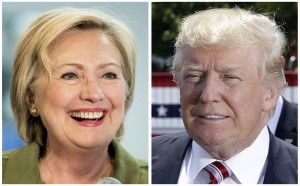
Hillary Clinton and Donald Trump (Photo credit: AP)
As polls opened on Election Day 2016, conventional election-forecasting models based on public opinion polling were unanimous in predicting a decisive victory for Democratic presidential candidate Hillary Clinton in the Electoral College — generally more than 300 electoral votes and a better than 70 percent probability of winning the election.
That is at variance with the Presidential/Personal Electability Index (PEI) developed at the Unit for the Study of Personality in Politics, which has accurately predicted the outcome of every presidential election since 1996, before Super Tuesday — 8 months prior to the presidential election.
The PEI heuristic model employs candidate personality traits, as publicly perceived, to predict which contender will resonate most favorably with independent and unaffiliated voters who base their voting choice primarily on the candidate’s personal qualities as publicly displayed rather than on party-political affiliation or allegiance.
Based on those criteria, here are the PEI projections for Hillary Clinton and Donald Trump formally released on February 29, 2016:
Donald Trump (PEI = 62; 45 corrected score)
Hillary Clinton (PEI = 39; 29 corrected score)
The PEI model’s predictive utility in recent presidential election cycles appears to derive from the practically even division of the nation into reliably Republican and Democratic voting blocks, essentially yielding the balance of power to politically independent and unaffiliated voters comprising as much as one-third of the electorate.
The PEI model assumes that candidates have been vetted by means of prior election to high-level public office and that they have the near-unanimous support of their political base and party establishment, so Trump’s candidacy violates the model’s fundamental assumptions. Consequently, the PEI may not be sufficiently robust to weather Trump’s unconventional candidacy.
November 9, 2016 update: Turns out the Presidential Electability Index is sufficiently robust.
Summary of conventional election-outcome projections as polls opened on Election Day
New York Times (‘The Upshot’)
Princeton Election Consortium (Sam Wang)
Rothenburg & Gonzales Political Report
FiveThirtyEight (Nate Silver)
Personal Electability Index data set
The Political Personality of 2016 Democratic Presidential Nominee Hillary Clinton (PDF, 34 pp.)
The Political Personality of 2016 Republican Presidential Nominee Donald J. Trump (PDF, 31 pp.)
Leave a Reply
You must be logged in to post a comment.


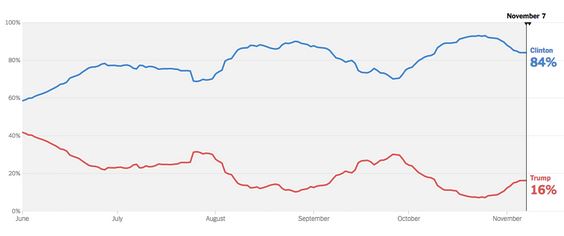
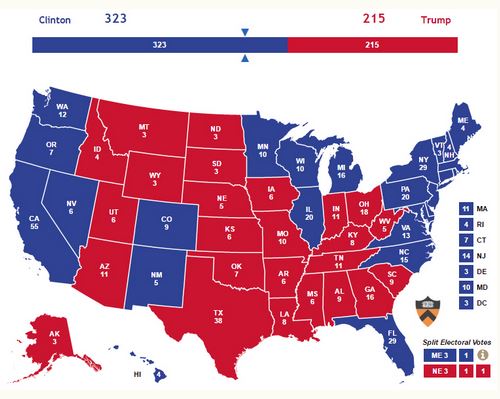

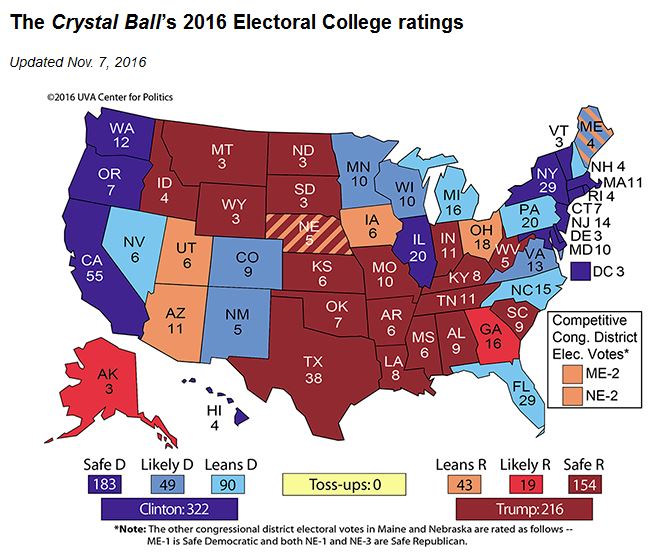
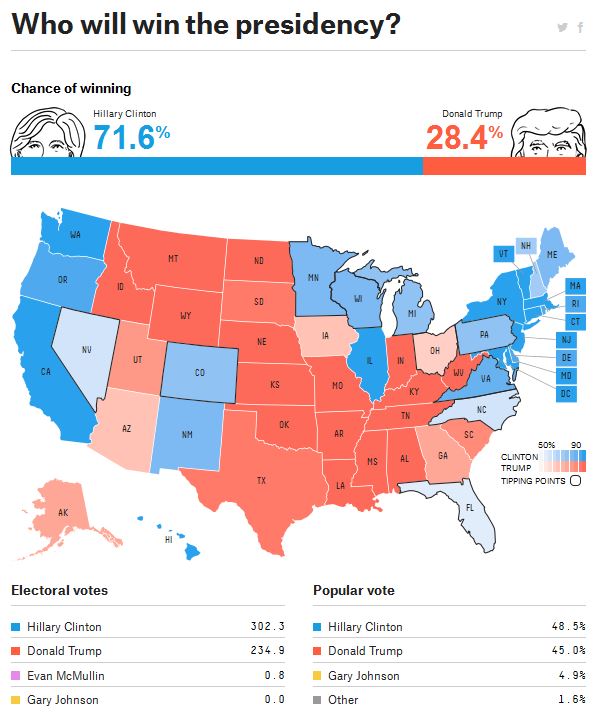
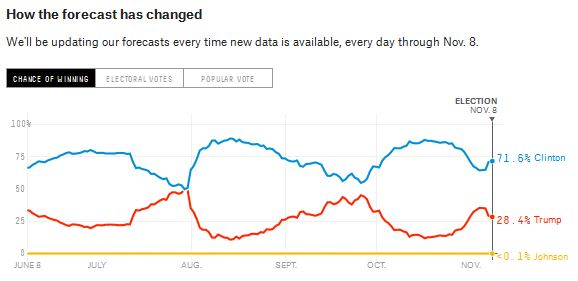
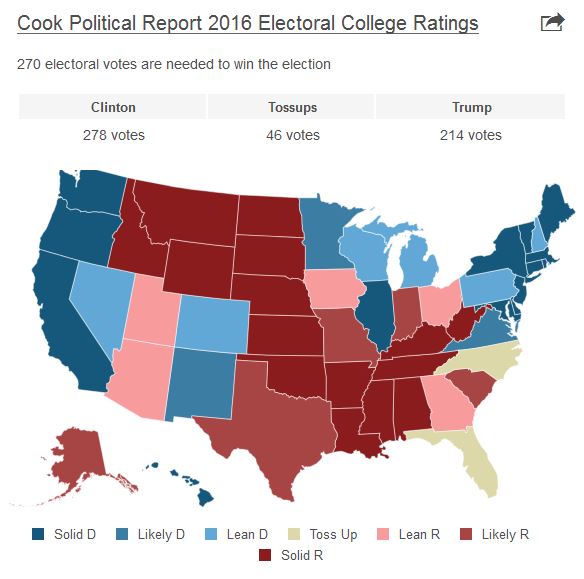
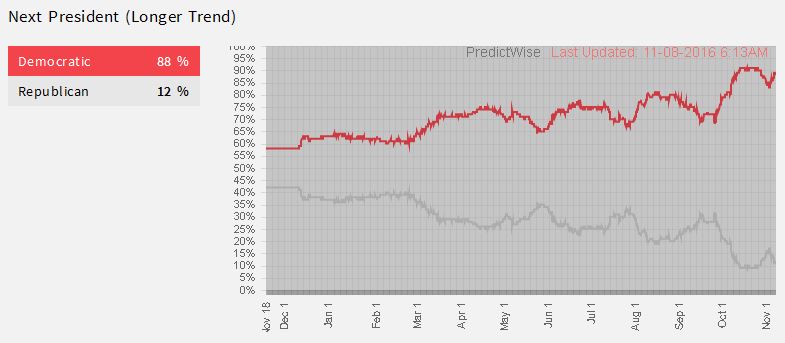

November 9th, 2016 at 12:03 am
Excerpts from an email (dated August 20, 2015) to St. Cloud Times opinion page editor Randy Krebs in which Aubrey Immelman first raised the possibility of Donald Trump winning the Republican primary and the 2016 presidential election, based purely on Trump’s psychological profile.
From: Immelman, Aubrey
Sent: Thursday, August 20, 2015 2:20 PM
To: Krebs, Randy
Subject: Re: Presidential candidate occasional series
[…]
The 5 p.m. deadline sounds good. […]
Trump is a fascinating phenom from my psychological perspective. Prior to his PEI score of 62 the most personally talented candidates I’ve studied were:
Bill Clinton 37
Michele Bachmann 32
George W. Bush 31
Barack Obama 28
I said in the kicker, a lot can change in the next year, but at this point I won’t be completely shocked if Trump wins it all.
[…]
Aubrey
December 4th, 2016 at 9:57 am
Cross-posted from “Democrats need to focus on the gut, not the head” (Fareed Zakaria, Washington Post, Dec. 1, 2016) » https://www.washingtonpost.com/opinions/democrats-need-to-focus-on-the-gut-not-the-head/2016/12/01/dfbe7782-b803-11e6-a677-b608fbb3aaf6_story.html
“And how do voters pick their favorite politicians? It is a gut decision that is more emotional than rational. Mostly it hinges on whether they identify with a politician in the social and psychological senses.”
That explains, in part, why the personal psychology-based Presidential Election Index (PEI) predicted as early as August 2015 that Donald Trump would win the Republican nomination and go on to defeat Hillary Clinton in the general election » http://www.immelman.us/news/clinton-vs-trump-predicting-the-2016-presidential-election-results/
December 18th, 2016 at 10:03 am
[…] Clinton vs. Trump: Predicting the 2016 Presidential Election Results (Nov. 8, 2016) […]
December 19th, 2016 at 12:02 am
[…] Clinton vs. Trump: Predicting the 2016 Presidential Election Results (Nov. 8, 2016) […]
December 27th, 2016 at 8:17 am
[…] Clinton vs. Trump: Predicting the 2016 Presidential Election Results (Nov. 8, 2016) […]
July 1st, 2019 at 7:26 pm
[…] Clinton vs. Trump: Predicting the 2016 Presidential Election Results (Nov. 8, 2016) […]